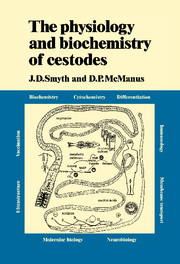Book contents
- Frontmatter
- Contents
- Preface
- Acknowledgements
- 1 The cestodes: general considerations
- 2 The adult cestode: special structural features relevant to its physiology
- 3 The adult cestode in its environment
- 4 The adult: general metabolism and chemical composition; lipid metabolism
- 5 The adult: carbohydrate metabolism
- 6 The adult: proteins and nucleic acids
- 7 The biology of the egg
- 8 Developmental biology of larvae
- 9 Development within definitive host
- 10 Cultivation of cestodes in vitro
- 11 Immunobiology of cestodes
- References
- Index
5 - The adult: carbohydrate metabolism
Published online by Cambridge University Press: 24 November 2009
- Frontmatter
- Contents
- Preface
- Acknowledgements
- 1 The cestodes: general considerations
- 2 The adult cestode: special structural features relevant to its physiology
- 3 The adult cestode in its environment
- 4 The adult: general metabolism and chemical composition; lipid metabolism
- 5 The adult: carbohydrate metabolism
- 6 The adult: proteins and nucleic acids
- 7 The biology of the egg
- 8 Developmental biology of larvae
- 9 Development within definitive host
- 10 Cultivation of cestodes in vitro
- 11 Immunobiology of cestodes
- References
- Index
Summary
General considerations
Basic problems
The carbohydrate metabolism of cestodes has been more extensively studied than any other aspect of metabolism; it has been the subject of a number of reviews (39, 41, 101, 102, 104, 129, 221, 398, 490, 492, 673, 698, 759, 816, 911, 931). Much work in this area has been aimed at the identification of biochemical steps which might differ substantially from the host metabolism and which may, therefore, be of value for rational drug design. Unfortunately, in practice, the approach has not proved to be very rewarding and virtually all useful drugs against cestodes have been developed empirically rather than rationally. The chemotherapy of cestodes will not be covered here as this aspect has been comprehensively reviewed (113, 114, 190, 735, 895, 946).
Interest has focussed on four main areas: (a) the nature of exogenous carbohydrates utilised by cestodes, (b) the mechanisms by which these carbohydrates are absorbed, (c) the pathways of carbohydrate catabolism and (d) the regulatory control of these pathways.
These investigations have shown that cestodes, in common with other parasitic helminths, utilise carbohydrate as the major, and possibly only, energy substrate. In addition, carbohydrate catabolism in cestodes is characterised by the excretion of reduced end-products (e.g. lactate, propionate, succinate) even under aerobic conditions.
Much of the information accumulated has been obtained from studies in vitro. The pitfalls inherent in trying to relate data from in vitro experiments to the situation in vivo are well recognised (490)
- Type
- Chapter
- Information
- The Physiology and Biochemistry of Cestodes , pp. 77 - 113Publisher: Cambridge University PressPrint publication year: 1989
- 2
- Cited by



